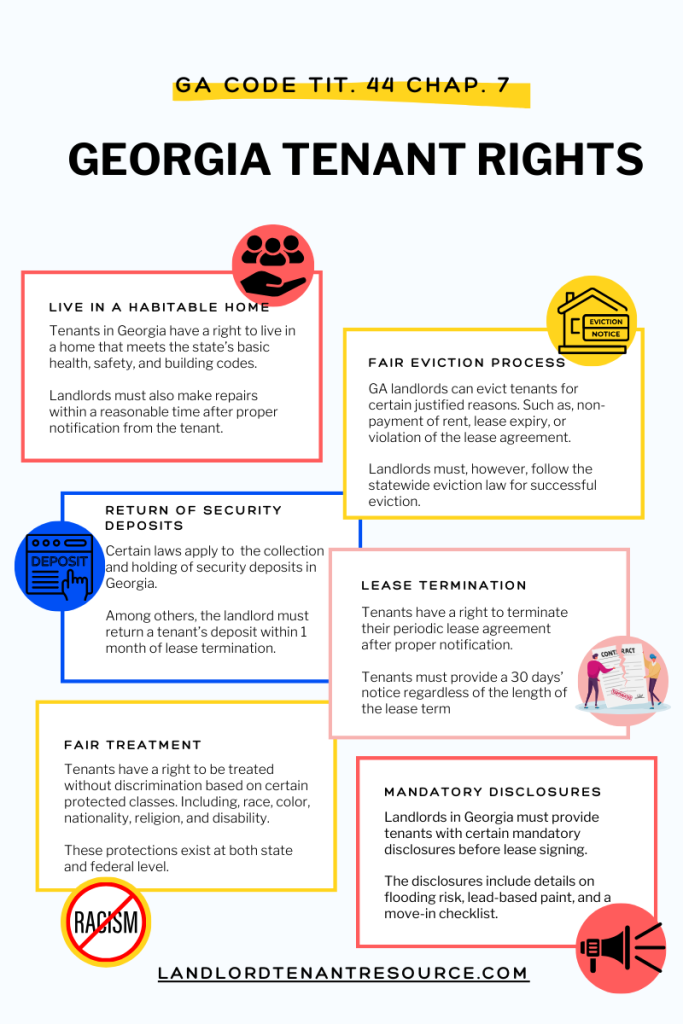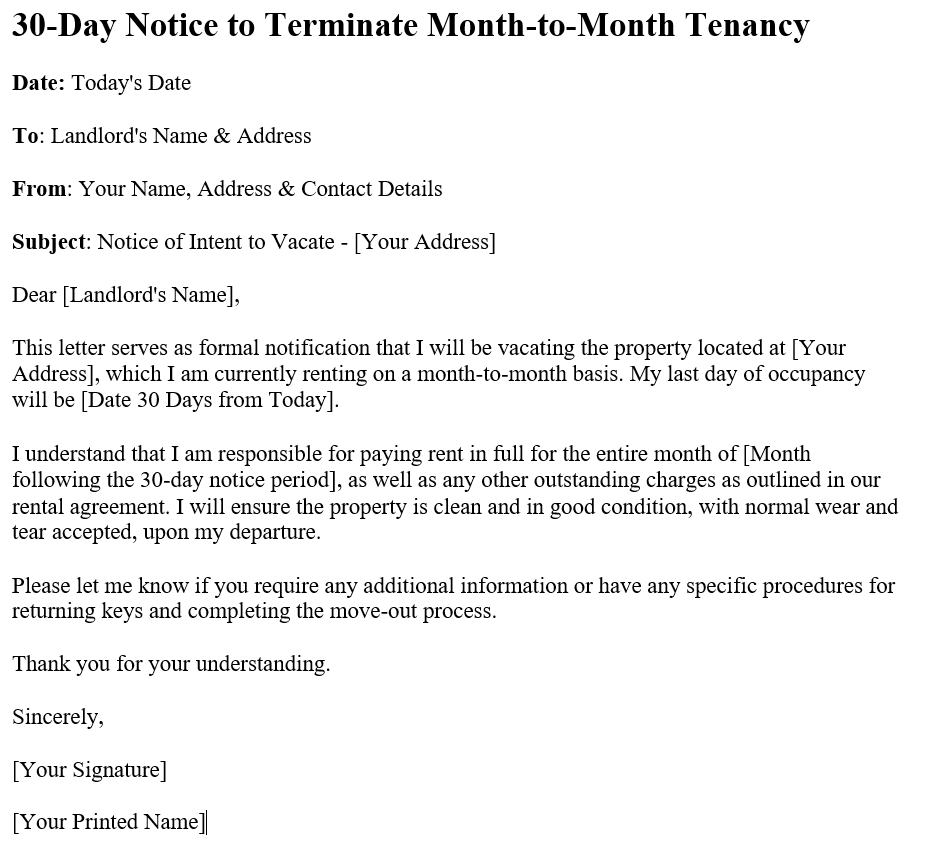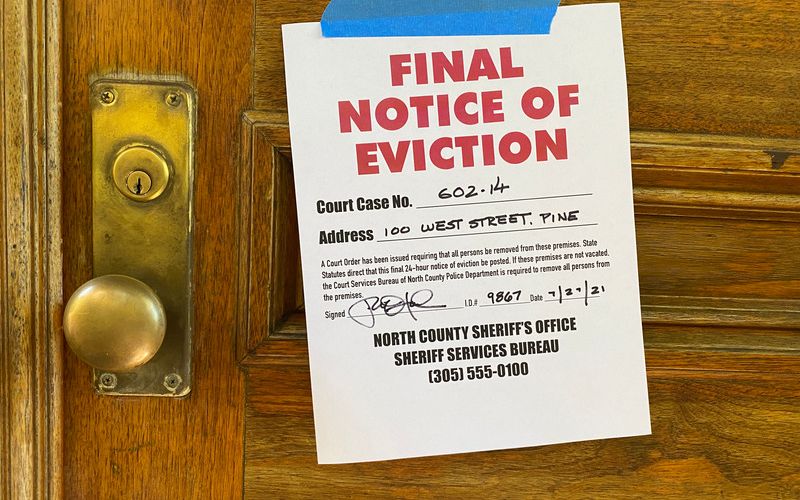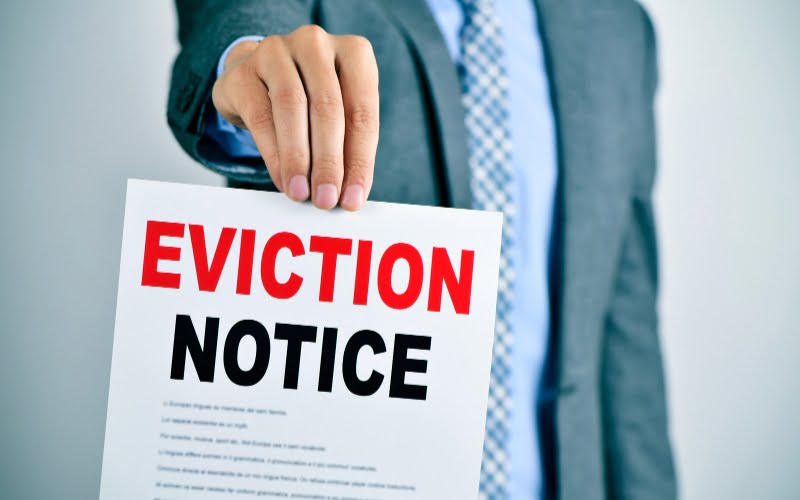Last Updated on May 31, 2024 by Kelvin Nielsen
Are you a tenant in Georgia and facing an eviction action from the landlord? Well, this article is specially meant for you. You’ll learn all the basics of the Georgia eviction process, including your basic rights, minimum notice requirements, and even how to stop your eviction.
But first…
Do you have 30 days to move after the eviction notice in Georgia? Not really! How much time you have after the landlord serves you with an eviction notice entirely depends on the reason for the eviction.
Sometimes, the move may need to occur immediately, such as in the case of illegal activity. At other times, the eviction notice may require you to move out within 60 days.
How Much Notice Does a Landlord Have to Give a Tenant to Move Out in Georgia
To kickstart the eviction process against a tenant, Georgia landlords must first serve them with an eviction notice to terminate the tenancy. The landlord must serve an appropriate notice depending on the violation a tenant has committed.
3-Day Notice to Pay Rent or Quit
If you are late on paying rent or utility bills, the landlord must serve you a 3 days’ notice. You will then need to pay the rent balance within three business days or move out. (2024 Ga. Laws Act 392 (H.B. 404); Ga.
60-Day Notice to Vacate for a Month-to-Month Tenancy
If you are on a month-to-month lease or don’t have a lease, the landlord must provide you with a 60 days’ notice to vacate. (Ga. Code § 44-7-7 (2024).)
Immediate Notice to Vacate for Lease Violations
If you violate a term of the lease, the landlord can order you to vacate the premises immediately. Examples of common lease violations include unauthorized guests, unauthorized pets, illegal property alterations, and damage exceeding normal wear and tear.
Immediate Notice to Vacate for Illegal Activity
If you engage in an illegal activity, the landlord can serve you an immediate notice to vacate. You won’t have an opportunity to fix an issue and must move out immediately or else face an unlawful detainer action.
Examples of illegal activity include prostitution, criminal activity, or building structures to provide sleeping quarters for pay.
How to respond to an eviction notice in Georgia?
Once the landlord has served you with an eviction notice, the following are the options you have.
First, you can choose to move out. If you can’t contest the eviction and can find alternative housing, then consider moving out within the notice period to avoid potential legal issues.
Note, however, that moving out doesn’t mean that your landlord has forgiven your rent balances or repair obligations. The landlord can still pursue you even after you have moved out.
The other option you have after getting served with an eviction notice is to comply. If, for instance, the eviction is due to unpaid rent, you can consider paying the full amount due. You must do this within the deadline.
Once you’ve paid the balance due, plus any late charges, the landlord cannot pursue further eviction proceedings against you.
Last but not least, you could choose to contest the eviction. If you have reasons to believe the landlord hasn’t been fair to you, you could fight the eviction in court.
To contest an eviction in Georgia, you’ll need to file an answer within 7 days of receiving a copy of the summons and complaint. This will provide you an opportunity to state the reasons why you shouldn’t be evicted.
What is the defense to eviction in Georgia?
In Georgia, you can fight an eviction by providing any of the following defenses.
- The landlord didn’t provide a proper notice.
- The allegation is non-existent. For example, in the case of rent nonpayment, you have proof of rent payment or it is the landlord that refused to accept your payment.
- The eviction is in retaliation to reporting the landlord for habitability issues.
- The landlord is discriminating against you due to a protected class, such as race, color, nationality, or religion.
Here is an exhaustive guide on how to fight an eviction in Georgia.
Can a landlord evict you without going to court in GA?
No! A landlord must go to court to evict you from your Georgia home. The landlord must follow a specific procedure necessary to obtain a court eviction order. The following are illegal things a landlord cannot do in Georgia when it comes to eviction.
One, the landlord cannot try to forcibly remove you from the property by carrying out “self-help” evictions. Examples of self-help eviction tactics include changing locks, shutting down utilities, or removing your personal belongings.
Two, the landlord cannot carry out a retaliatory eviction. The landlord cannot try to evict you for exercising a legally protected right. For example, forming or joining a tenant’s union, or complaining about habitability issues to a local government agency.
Or three, carry out an eviction based on a tenant’s protected class. Protected classes in Georgia include race, color, religion, sex, and nationality.
What are my rights as a tenant in Georgia?
GA Code Title 44 Chapter 7 grants you a smorgasbord of rights. And they exist regardless of what the lease says. What’s more, the landlord cannot force you to waive them at any point during the contractual lease period.

How much notice is required to terminate a month-to-month tenancy in Georgia?
To terminate your periodic lease, such as a month-to-month tenancy, you must provide your landlord with a 30 days’ notice.

Conclusion
So, do you have 30 days after eviction notice in Georgia? Clearly, that is not the case. How much notice you have after the landlord serves you an eviction notice depends on the violation you have committed. This period can range from immediate to up to 60 days!
Disclosure: The content herein isn’t a substitute for advice from a professional attorney. It’s only meant to serve educational purposes. If you have a specific question, kindly seek expert attorney services.
Sources: GA Code Title 44 Chapter 7, Georgia Landlord-Tenant Handbook

I am a real estate attorney with over 11 years of experience in tenant eviction cases. My mission here at LTRC is to help answer your commonly asked questions on everything regarding real estate laws, especially on eviction matters.
I’m a member of the following professional organizations: Attorneys’ Real Estate Councils of Florida (ARECs), Florida Bar Real Property, Probate & Trust Law Section, American College of Real Estate Lawyers (ACREL), and the Florida Association of Community Managers (FACM).







